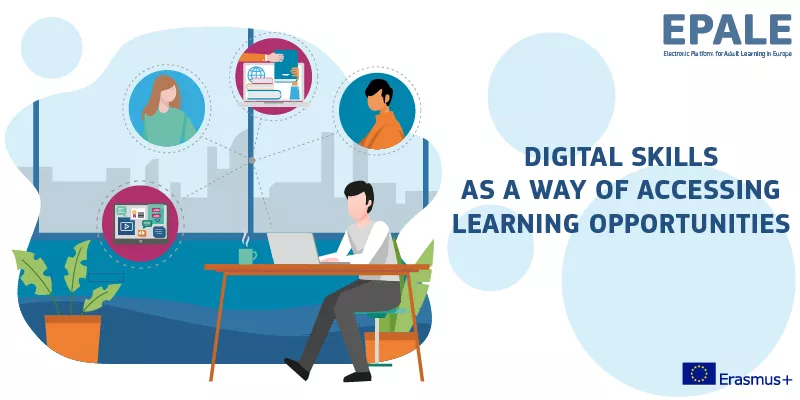EPALE discussion: digital skills as a way of accessing learning opportunities

As part of our April-June 2020 focus on Digital skills as a way of accessing learning opportunities, EPALE is organising an online discussion.
The large number of adults with poor basic digital skills represents a major obstacle in achieving an inclusive society and reducing social inequalities. Too few adults have access to adult learning resources, and this has a real impact on their personal development and employment prospects.
Providing adult-specific teaching methods to help trainers to become more effective in their work requires specialised training and continuous professional development geared towards adult-specific teaching strategies.
Moreover, the Covid-19 pandemic has forced everyone to adapt to new ways of working and pushed adult educators to explore and adopt new online tools and techniques to allow them continue their training and learning activities.
The discussion will take place on this page on 27 May between 10:00 and 16:00 CET and will be moderated by EPALE Thematic Coordinator Altheo Valentini and by EPALE Content Assistant Claudia D'Eramo.
► Share your stories, tips, case studies and good practices with the EPALE community!
Also, if you’ve ever been involved in successful projects, or if you have developed any relevant methodologies – share your story with the other participants in the comments below!
The discussion on 27 May will include the following topics:
|
► Comments will be open on 20 May so participants can introduce themselves or post their comments in advance.
Comments
I agree you!
Only more possibilities
Learning
I agree nothing replaces the social aspect of education. At school students learn, socialise and participate in extra curricular activities. Online learning is effective and has a major role as well especially when students cannot physically attend in schools.
advantages and maybe disadvantages
I see great advantages for people in rural areas, because there are not so many topics (and advanced topics) to offer. Educational institutions in rural areas often do not reach enough participants for specialist topics and advanced seminars because fewer people live in their region than in large cities.
I also see advantages for people with handicaps who cannot simply leave home. If we manage to create barrier-free digital learning offers, then it would be easier for these people to participate. Unfortunately, many offers are not yet barrier-free.
New means
Online event hosted by EPALE UK and Ireland
More info on this online event
E-Testing in VET
e testing
AW: E-Testing in VET
- Besmart - Servicestelle für Ausbildung 4.0: https://besmartausbildung.de/
- innotrain - innovative Training in VET: https://www.whkt.de/index.php?id=3090&L=1
- Transferstelle Digitale Kompetenzen: https://kompetenzen-digitaler-wandel.de/
- Quality in VET: https://ausbildungsqualitaet-berlin.de/
Maybe someone from Austria?
...online study and e-testing...
Learning about covid-19
platforms or webpages on Covid-19
Hi Lena! Good question,
good answer-thank you!
Curating knowledge
Digital Literacy for all!
Virtual learning and digital skills
Totally agree - ICT saved our world!
situation
How do you prepare the adult learners for online learning?
preparing adult learners for online learning
Online learning
We have to be prepared for future
Digital Literacy for all!
The work of my organisation WISE KIDS is focused more around the digital media literacy needs of users once they begin accessing online platforms and communities.
Best regards,
Hi!Here in Latvia we can
New efforts
Learning online doesn't fit all
Hi from Austria! I absolutely
I absolutely agree with what you say and I am glad that you mentioned the importance of meeting every indidual's needs in order to provide suitable settings for the digital learning process.
And you're totally right, online conversations will never ever replace face-to-face communication and human interaction - and I'm glad it won't!
Not either or
digital learning in classrooms
Distance & on-line learning is the future of Adult Learning
PortalDigi success story
Good luck with the project!
Digital skills' assessment and recommendation tools
distance learning,and how to reshape adults education at the ter
distance learning
It is important
RESHAPE
Dear Irini,
Emergency remote teaching as an opportunity
Shift in roles
Hello Dora,I'm sure the EPALE
I'm sure the EPALE community would benefit from this experience. Why don't you share your story in the Community Stories Initiative?
Claudia D'Eramo, EPALE Moderator
Online student interaction
Manouk


Lessons learned